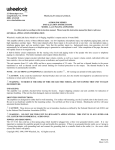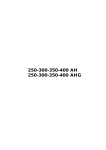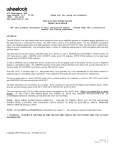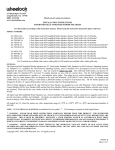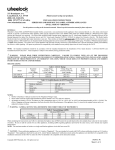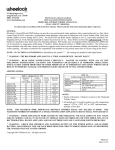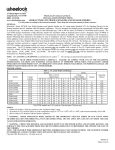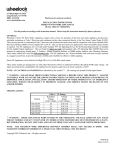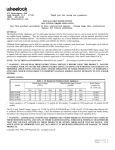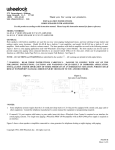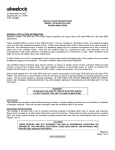Download Wheelock TPI-100 Instruction manual
Transcript
273 Branchport Avenue Long Branch, N.J. 07740 (800) 631-2148 www.wheelockinc.com Thank you for using our products. AUDIOLINK SERIES INSTALLATION INSTRUCTIONS MODELS AA-20/AA-40 PAGING AND COMMERCIAL PA AMPLIFIERS Use this product according to this instruction manual. Please keep this instruction manual for future reference. GENERAL APPLICATION INFORMATION: Wheelock's AudioLink Series Model AA-20 and AA-40 Amplifier are output rated at 20 watts RMS and 40 watts RMS respectively. These amplifiers afford a choice of four different inputs: two low impedance microphone inputs, one telephone paging input, and one high impedance auxiliary input. Three input channels allow these inputs to be used actively at one time: one microphone input, a choice of a telephone paging input or a second microphone input, and an auxiliary input. Note that the auxiliary input (i.e., background music, tone generator, etc) may be automatically soft muted whenever a telephone page is generated or a microphone is used. After completion of the page, the music will rapidly return to its original level. This function is switch selectable. A built-in limiter circuit compensates for the varying voice levels and paging styles of the people who have access to telephone paging or a microphone. The limiter maintains rated output without distortion. This function is switch selectable. The amplifiers feature tamper-resistant individual input volume controls, as well as a master volume control, individual treble and bass controls, a low-cut horn protect switch, one input selector switch, a power on indicator, a limiter ON-OFF switch, a music mute ON-OFF switch, a peak level indicator, and a line output jack. Both models operate from 115 volts, 60Hz as well as 230 volts, 50Hz, switch selectable, and have a power consumption of 65 watts (AA-20) and 115 watts (AA-40). The units have a thermal breaker in the power transformer as well as a thermal cut-off and current limiting for overload protection on the output. The thermal breaker in the transformer is automatically resettable. NOTE: All CAUTIONS and WARNINGS are identified by the symbol . All warnings are printed in bold capital letters. CAUTION: In the event the transformer's thermal breaker does not reset, have the trouble investigated by an authorized service technician or return unit to the factory. WARNING: TO REDUCE THE RISK OF FIRE OR ELECTRIC SHOCK, DO NOT EXPOSE THIS UNIT TO RAIN OR MOISTURE. UNPACKING: The amplifier was carefully checked before leaving the factory. Inspect shipping container and unit carefully for indication of improper handling. If the unit has been damaged, make an immediate claim to the carrier. MOUNTING INSTRUCTIONS: The amplifiers are designed for either shelf or wall mounting. For surface wall mounting, use the 2 keyhole slots in the chassis cover. Be sure to use hardware suitable for the mounting surface. Do not block air flow to top, front, back or bottom. Blocking the air flow will cause automatic thermal shutdown. CAUTION: These devices are not intended for use in hazardous locations as defined by the National Electrical Code (NEC) and by the National Fire Protection Association (NFPA). WARNING: DO NOT USE THIS UNIT IN LIFE-SAFETY APPLICATIONS. THIS UNIT IS UL 813 LISTED AND CUL LISTED FOR COMMERCIAL AUDIO ONLY. POWER AND GROUNDING: The 115 VAC line cord has a three-prong plug which should be plugged into a three wire grounded electric outlet. It is very important to maintain the amplifier ground for safe and trouble-free operation. If there is no grounded electric outlet, use a 2 prong to 3 prong plug adapter, with grounding lead, and connect the grounding lead to a metallic bond on the outlet; (i.e. the screw which secures the outlet's wall plate). VOLTAGE SELECTION: Factory set @ 115VAC for U.S. market; units for export are set @ 230VAC. Make absolutely certain that the voltage selection switch, located on the side of the amplifier, is set for the intended line voltage (i.e., 115VAC or 230VAC). Improper voltage selection can result in permanent damage to, or failure of, the unit. Copyright 1995, 1998, 1999 Wheelock, Inc. All rights reserved. P82724 E Sheet 1 of 9 TECHNICAL SPECIFICATIONS: 1 2 3 4 5 # PARAMETERS Power Output @ 1KHz Total Harmonic Distortion Outputs Line Output INPUTS Impedance 6 Sensitivity 7 Frequency Response 8 Signal to Noise Ratio AA-20 20 Watts RMS AA-40 40 Watts RMS Less than 1% THD 8 OHMS, 25V, 70.7V, 100V 1.1V TELEPHONE MIC 1/MIC 2 AUX 600 OHMS 600 OHMS 12K OHMS -20dBM (77.5mV 1mV 220mV -16 +20) 300Hz-5kHz 50Hz-15kHz 50Hz-15kHz TOLERANCE ±1dB +1% ±1.5dB ±20% ----------TEL ±2dB MIC ±.5mV AUX ±20%, -50% ±3dB 65dB 60dB 70dB -4dB +10dB Transformer Balanced or Isolated/Bal. Unbalanced Unbalanced -----TEL/MIC 1, MIC 2, AUX, BASS, TREBLE, MASTER VOLUME, TEL/MIC 1 SW., LIMITER ON/OFF SW., AUX MUTE ON/OFF SW. LO CUT SWITCH 9 10 Type of Input Controls 11 Indicators Green LED - Power ON Red LED - Peak Level 12 Protection Transformer thermal circuit breaker, no-load, low-load, short circuit and thermal overload protection on output and supply regulators. AA-20 AA-40 TOLERANCE -10.5dB TO +10.5dB @ 12kHz ±4dB +10.5dB TO -10.5dB @ 100Hz ±4dB -6dB @ 250Hz +1dB, -2dB ±4dB output level maintained without clipping, even while exceeding rated input level up to -----20dB. Output level 1 watt for 40dB muting Min. # PARAMETERS 13a Treble Control 13b Bass Control 14 Lo-Cut Switch 15 Automatic Limiter For Paging 16 17 Automatic Mute Operation Regulation 18 RFI Protection 19 Consumption @ FRO No load to full load output less than 2dB ------ RFI test: use CB transmitter output in same room - minimum 20ft. from amplifier. 65 Watts 115 Watts -----±5% COMMENTS 115VAC 60Hz ±5% 230VAC 50Hz ±5% Same as above @ Rated Output Bal. or Unbal. RL = 150 OHMS -----@ 1kHz To Produce Rated Output Ref. 1kHz @ 1W 25kHz MAX. Not Weighted -----Front Panel Mount Front Panel Mount Front Panel Mount -----COMMENTS ---------------Paging Inputs Mute of music output while page is activated Stability of amp. with or without load No Pickup @ 115VAC, 60Hz, ±5% INPUT CONNECTIONS: (Figures 1 & 2) P82724 E Sheet 2 of 9 CAUTION: Disconnect power prior to connecting or disconnecting to either the inputs or the outputs. Failure to disconnect power when connecting or disconnecting inputs or outputs could cause internal damage. Telephone Paging Input (Figure 1): Connect telephone wires to the input screw terminals marked TIP and RING. Set TEL/MIC 1 Switch (on front panel) to TEL position. For Tip and Ring connections to various types of telephone paging access, see Figures 7A, B & C. NOTE: This input is a transformer isolated, line level input and may be used for applications other than telephone paging (i.e. tone signaling). Microphone Inputs (Figure 1): Connect balanced low-impedance microphone wires to the input screw terminals marked LO-Z. The shield must be connected to the GND screw terminals. An unbalanced microphone may be connected to the same screw terminals. However, one of the two LO-Z terminals for that input must be connected to the adjacent screw terminal marked GND. Install a jumper wire, between one LO-Z screw terminal and the GND screw terminal. NOTE: To avoid noise pick-up, the microphone input cable should be a shielded cable, with the shield connected to the input GND terminal. MIC 2 is a low impedance (LO-Z) microphone input channel. TEL/MIC 1 is a switch selectable telephone paging, or low impedance (LO-Z) microphone input channel. Input Connections Figure 1. Auxiliary Input (Figure 2): To connect an FM tuner, CD player, tape player, tone generator, or any other line level program source (i.e., mic/line mixer) to the AUX input jack on the side panel, use a single conductor shielded cable terminated in a standard RCA type phono plug. AUX input is a high impedance (HI-Z) input channel. Aux High Impedance (Hi-Z) Input Figure 2: (AA-40 Shown - AA-20 Similar) OUTPUT CONNECTIONS: (Figures 3 & 4) Referring To Figure 3: P82724 E Sheet 3 of 9 Connect output wires from the speaker load to the COM screw terminal and the selected constant voltage terminal, (i.e. 25V, 70V or 100V). The constant voltage distribution method facilitates the use of multiple speakers in parallel with a single amplifier. Note that each speaker must have its own 25V or 70V or 100V line-matching transformer. Select the wattage tap on the line matching transformer of each speaker, for the desired power. An 8 ohm speaker load may be connected to the COM and the 8 ohm terminal. An 8 ohm speaker or an 8 ohm total speaker load rated for at least the amplifier's output should be used. (Example: An 8 ohm, 20 watt horn for the AA-20.) PROPER WIRE SIZE/LENGTH To minimize power loss in the system cabling, use a wire gauge suitable for the power being distributed and the length of cable. Use the following table as a guide: 2 WIRE COPPER CABLE LENGTHS FOR SPEAKER LINES AT 0.5dB LOSS IN SPL (12.5% POWER LOSS IN WATTS) AWG SIZE 10 12 14 16 18 20 22 LOW IMPEDANCE SPEAKER LINE 4 8 16 OHMS OHMS OHMS 120 240 480 75 150 300 50 95 190 30 60 120 20 40 75 15 25 50 10 15 30 70 VOLT SPEAKER LINE NOMINAL POWER IN THE LOAD 5W 30,000 19,000 12,000 7,500 4,700 3,000 1,800 10W 15,000 9,100 5,600 3,600 2,300 1,400 900 15W 30W 50W 9,900 5,000 3,000 6,200 3,100 1,900 3,800 1,900 1,200 2,400 1,200 750 1,500 750 470 960 480 300 600 300 190 LENGTH IN FEET 100W 1,500 940 600 370 230 150 95 200W 730 460 280 180 ---------------- AWG SIZE 10 12 14 16 18 20 22 NOTES: (1) For 25 volt line divide all 70 volt lengths by 8. (2) For 100 volt line multiply all 70 volt lengths by 1.42. (3) To allow for future expansion, and distribution cable line loss, it is recommended that the total system wattage should not exceed 85% of the amplifier's rated output (i.e. 17 watts for the AA-20 and 34 watts for the AA-40). (4) The total system wattage requirement is the summation of the wattage tap selections of all system speakers and horns. CAUTION: Per the National Electrical Code, Class 1 wiring should be used for the 100V output. Class 2 wiring is acceptable for all other outputs. Output Connections WARNING: THE COVER FOR THE 100V AUDIO OUTPUT TERMINAL MUST BE ATTACHED AT ALL TIMES. THE POWER CORD MUST BE DISCONNECTED BEFORE CONNECTING TO THE 100V TERMINAL. THE COVER MAY BE REMOVED TO CONNECT A WIRE TO THE TERMINAL, BUT IT MUST BE REATTACHED AFTER CONNECTING THE WIRE. FAILURE TO MAINTAIN THE TERMINAL COVER IN PLACE COULD EXPOSE YOU AND/OR OTHERS TO ELECTRICAL SHOCK Figure 3. WHICH COULD RESULT IN SERIOUS INJURY OR DEATH. Line Output: (Figure 5) The LINE OUTPUT jack on the side panel, can be used to cascade amplifiers (including amplified speakers, or Wheelock PRM 150 preamplifiers), or feed audio signal to a tape recorder. The signal on this output is a line level mix of the amplifier's input channels. Use single conductor shielded cable with a standard RCA type phone plug. P82724 E Sheet 4 of 9 Line Output Figure 4. NOTE: The line output signal is constant and is unaffected by the amplifiers master volume, bass and treble controls. CASCADING AMPLIFIERS: (Figure 5) AA-20 and AA-40 amplifiers can be cascaded to expand existing systems or to distribute large speaker loads. Cascading Amplifiers Connecting A Tape Recorder Figure 5. Figure 6. TO CONNECT A TAPE RECORDER: (Figure 6) A tape recorder can be connected to record live programs (microphone inputs), or all of the amplifiers activity (all inputs). P82724 E Sheet 5 of 9 Telephone Paging Access Connections Audio Page Port Figure 7A. CO Line, Centrex Number Line, Or Analog Station Extension Port Figure 7B. (Refer to TPI-100 installation instructions for internal control settings and adjustments.) Unused CO Line/Trunk Port Or Stand Alone Telephone Figure 7C. OPERATION P82724 E Sheet 6 of 9 Figure 8. (Front panel controls, switches and indicators.) NOTE: All controls rotate clockwise to increase and counterclockwise to decrease. EXTERNAL CONTROLS AND INDICATORS: (Figure 8) NOTE: Volume/Tone controls are tamper resistant and must be adjusted with a screwdriver. Power ON-OFF Indicator: The LED will illuminate when the AC cord is plugged into a 115/230VAC source. Power Input Voltage Select Switch: (Located next to power cord connector on the side of the amplifier) This switch must be set for the appropriate line voltage (i.e., 115VAC for United States). U.S. market versions are factory set at 115VAC. Master Volume Control: Adjusts the total output level of the amplifier without disturbing the individual settings of the microphone, telephone and auxiliary input volume controls. (Set at factory in minimum position.) TEL/MIC 1 Volume Control: Adjusts the volume of either the TEL (Telephone) paging or MIC 1 (Microphone) input. (Set at factory in the minimum position.) MIC 2 Volume Control: Adjusts the volume of either the MIC 2 input. (Set at factory in the minimum position.) AUX Input Volume Controls: Adjusts the volume of the AUX input. (Set at factory in the minimum position.) Bass and Treble Controls: Adjusts bass and treble for optimum tonal balance of the output signal. The amplifier frequency response is flat with the controls set at the center position. (Set at factory in flat position). TEL/MIC 1 Selector Switch: Switch to TEL position for telephone paging, or switch to MIC 1 position when using a microphone. (Set at factory in the TEL position). P82724 E Sheet 7 of 9 Lo-Cut Horn Protect Switch: Turn the switch ON whenever horns are used in the system. This function will protect the horn voice coils from damage by filtering out low frequencies inherent in some types of music when played at high power settings. (Set at factory in ON position.) Peak Level Indicator: Occasional flickering of the LED indicates momentary peak levels, and is a normal operating condition. Steady illumination of the LED is an indication that an overdrive (clipping) condition may exist. If distortion is audible, then lower the appropriate input volume control, and/or the master volume control. Limiter ON-OFF Switch: A limiter is desirable for many paging applications because it will help the paging volume sound uniform (compensates for the differences of loudness in people's voices). For live program applications, (i.e., house of worship, auditoriums, etc.) it is often desirable to defeat the limiter function. This results in more "natural" (wider dynamic range) sound reproduction. Thus, the AA Series Amplifier may also be used in general purpose commercial/PA applications (set at the factory in the ON position). Music Mute ON-OFF switch: In certain applications (i.e., noise masking, tone signals, etc.), it is often desirable to defeat the auxiliary input mute function. This results in the auxiliary input signal mixing (occurring simultaneously) with telephone paging or microphone input audio. For example, a 4 channel MIC/Line mixer could be patched in at this point and it's signal would not be muted by signal on the 2 other microphone inputs. Thus a 6 microphone system for conferences, etc., is achieved. (Set at factory in the ON position). CAUTION: To prevent electrical shock do not use this (polarized) plug with an extension cord, receptacle or other outlet unless the blades can be fully inserted to prevent blade exposure. Attention: Pour prevenir les chocs electriques ne pas utiliser cette fiche polarisee avec un prolongateur, une prise de courant out une autre sortie de courant, sauf si les lames preuvent ete inserees a fond sans en laisser aucune partie a decouvert. MAINTENANCE: CAUTION: There are no user-replaceable parts within the unit. Have all internal servicing done by a qualified technician. ANY MATERIAL EXTRAPOLATED FROM THIS DOCUMENT OR FROM WHEELOCK MANUALS OR OTHER DOCUMENTS DESCRIBING THE PRODUCT FOR USE IN PROMOTIONAL OR ADVERTISING CLAIMS, OR FOR ANY OTHER USE, INCLUDING DESCRIPTION OF THE PRODUCT'S APPLICATION, OPERATION, INSTALLATION AND TESTING IS USED AT THE SOLE RISK OF THE USER AND WHEELOCK WILL NOT HAVE ANY LIABILITY FOR SUCH USE. Limited Warranty Wheelock products must be used within their published specifications and must be PROPERLY specified, applied, installed, operated, maintained and operationally tested in accordance with these instructions at the time of installation and at least twice a year or more often and in accordance with local, state and federal codes, regulations and laws. Specification, application, installation, operation, P82724 E Sheet 8 of 9 maintenance and testing must be performed by qualified personnel for proper operation in accordance with all of the latest National Fire Protection Association (NFPA), Underwriters' Laboratories (UL), Underwriters’ Laboratories of Canada (ULC), National Electrical Code (NEC), Occupational Safety and Health Administration (OSHA), local, state, county, province, district, federal and other applicable building and fire standards, guidelines, regulations, laws and codes including, but not limited to, all appendices and amendments and the requirements of the local authority having jurisdiction (AHJ). Wheelock products when properly specified, applied, installed, operated, maintained and operationally tested as provided above are warranted against mechanical and electrical defects for a period of three years from date of manufacture (as determined by date code). Correction of defects by repair or replacement shall be at Wheelock's sole discretion and shall constitute fulfillment of all obligations under this warranty. THE FOREGOING LIMITED WARRANTY SHALL IMMEDIATELY TERMINATE IN THE EVENT ANY PART NOT FURNISHED BY WHEELOCK IS INSTALLED IN THE PRODUCT. THE FOREGOING LIMITED WARRANTY SPECIFICALLY EXCLUDES ANY SOFTWARE REQUIRED FOR THE OPERATION OF OR INCLUDED IN A PRODUCT. WHEELOCK MAKES NO REPRESENTATION OR WARRANTY OF ANY OTHER KIND, EXPRESS, IMPLIED OR STATUTORY WHETHER AS TO MERCHANTABILITY, FITNESS FOR A PARTICULAR PURPOSE OR ANY OTHER MATTER. USERS ARE SOLELY RESPONSIBLE FOR DETERMINING WHETHER A PRODUCT IS SUITABLE FOR THE USER'S PURPOSES, OR WHETHER IT WILL ACHIEVE THE USER'S INTENDED RESULTS. THERE IS NO WARRANTY AGAINST DAMAGE RESULTING FROM MISAPPLICATION, IMPROPER SPECIFICATION, ABUSE, ACCIDENT OR OTHER OPERATING CONDITIONS BEYOND WHEELOCK'S CONTROL. SOME WHEELOCK PRODUCTS CONTAIN SOFTWARE. WITH RESPECT TO THOSE PRODUCTS, WHEELOCK DOES NOT WARRANTY THAT THE OPERATION OF THE SOFTWARE WILL BE UNINTERRUPTED OR ERROR-FREE OR THAT THE SOFTWARE WILL MEET ANY OTHER STANDARD OF PERFORMANCE, OR THAT THE FUNCTIONS OR PERFORMANCE OF THE SOFTWARE WILL MEET THE USER'S REQUIREMENTS. WHEELOCK SHALL NOT BE LIABLE FOR ANY DELAYS, BREAKDOWNS, INTERRUPTIONS, LOSS, DESTRUCTION, ALTERATION, OR OTHER PROBLEMS IN THE USE OF A PRODUCT ARISING OUT OF OR CAUSED BY THE SOFTWARE. THE LIABILITY OF WHEELOCK ARISING OUT OF THE SUPPLYING OF A PRODUCT, OR ITS USE, WHETHER ON WARRANTIES, NEGLIGENCE, OR OTHERWISE, SHALL NOT IN ANY CASE EXCEED THE COST OF CORRECTING DEFECTS AS STATED IN THE LIMITED WARRANTY AND UPON EXPIRATION OF THE WARRANTY PERIOD ALL SUCH LIABILITY SHALL TERMINATE. WHEELOCK IS NOT LIABLE FOR LABOR COSTS INCURRED IN REMOVAL, REINSTALLATION OR REPAIR OF THE PRODUCT BY ANYONE OTHER THAN WHEELOCK OR FOR DAMAGE OF ANY TYPE WHATSOEVER, INCLUDING BUT NOT LIMITED TO, LOSS OF PROFIT OR INCIDENTAL OR CONSEQUENTIAL DAMAGES. THE FOREGOING SHALL CONSTITUTE THE SOLE REMEDY OF THE PURCHASER AND THE EXCLUSIVE LIABILITY OF WHEELOCK. IN NO CASE WILL WHEELOCK'S LIABILITY EXCEED THE PURCHASE PRICE PAID FOR A PRODUCT. Limitation of Liability WHEELOCK'S LIABILITY ON ANY CLAIM OF ANY KIND, INCLUDING NEGLIGENCE AND BREACH OF WARRANTY, FOR ANY LOSS OR DAMAGE RESULTING FROM, ARISING OUT OF, OR CONNECTED WITH THIS CONTRACT, OR FROM THE MANUFACTURE, SALE, DELIVERY, RESALE, REPAIR OR USE OF ANY PRODUCT COVERED BY THIS ORDER SHALL BE LIMITED TO THE PRICE APPLICABLE TO THE PRODUCT OR PART THEREOF WHICH GIVES RISE TO THE CLAIM. WHEELOCK'S LIABILITY ON ANY CLAIM OF ANY KIND SHALL CEASE IMMEDIATELY UPON THE INSTALLATION IN THE PRODUCT OF ANY PART NOT FURNISHED BY WHEELOCK. IN NO EVENT SHALL WHEELOCK BE LIABLE FOR ANY CLAIM OF ANY KIND UNLESS IT IS PROVEN THAT OUR PRODUCT WAS A DIRECT CAUSE OF SUCH CLAIM. FURTHER, IN NO EVENT, INCLUDING IN THE CASE OF A CLAIM OF NEGLIGENCE, SHALL WHEELOCK BE LIABLE FOR INCIDENTAL OR CONSEQUENTIAL DAMAGES. SOME STATES DO NOT ALLOW THE EXCLUSION OR LIMITATION OF INCIDENTAL OR CONSEQUENTIAL DAMAGES, SO THE PRECEDING LIMITATION MAY NOT APPLY TO ALL PURCHASERS. 7/99 P82724 E Sheet 9 of 9









